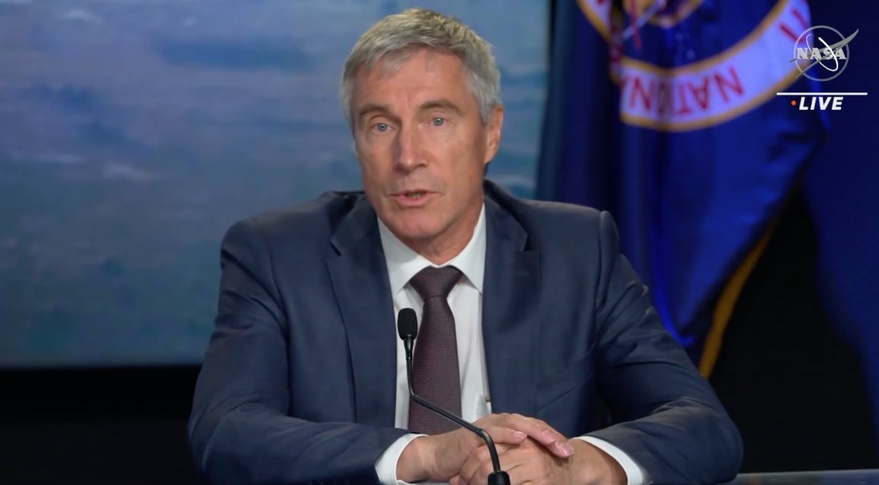Products You May Like
WASHINGTON — After a successful launch of a Crew Dragon spacecraft whose crew included a Russian cosmonaut, a Roscosmos official struck a more conciliatory tone about relations with NASA.
At a briefing after the Oct. 5 launch of the Crew-5 mission from the Kennedy Space Center, Sergei Krikalev, executive director of human space flight programs at Roscosmos, emphasized long-running cooperation between the United States and Russia in civil space, cooperation that has been strained since Russia’s invasion of Ukraine in February.
“We just continue what we started many years ago in 1975 when the Apollo-Soyuz crew worked together, and now we continue our cooperation,” he said after mentioning a “new phase of cooperation” with the exchange of seats between NASA and Roscosmos.
That seat barter agreement, completed in July, allowed NASA astronaut Frank Rubio to fly to the International Space Station last month on a Soyuz spacecraft. Roscosmos cosmonaut Anna Kikina, in turn, was on the Crew-5 mission. The agreement includes exchanges between Soyuz and Crew Dragon missions in 2023 and 2024.
Joel Montalbano, NASA ISS program manager, said the agency plans to extend that agreement to cover Boeing’s CST-100 Starliner, which, once certified for crewed flights, will alternate ISS missions with Crew Dragon. “Once a Boeing gets up and running our plan is to continue this cooperation on the Boeing missions,” he said. “As we extend space station — get partner across-the-board agreement to extend past ’24 — we will also extend the agreement.”
One seat remains open on the first operational Starliner mission, Starliner-1, after NASA announced Sept. 30 it has assigned astronauts Scott Tingle and Mike Fincke as commander and pilot, respectively, to that mission. With another NASA astronaut, Jeannette Epps, already assigned to the mission, only one seat remains available for either a Russian cosmonaut or astronaut from another ISS partner, although NASA noted that Epps is also training on Crew Dragon “to protect for other flight opportunities.”
NASA and Roscosmos, along with the U.S. State Department and Russia’s Foreign Ministry, completed that agreement despite incendiary rhetoric at times from the head of Roscosmos at the time, Dmitry Rogozin, who appeared to threaten to abandon the ISS and allow it to reenter. NASA leadership responded by emphasizing the “professional” relationship between the agencies in continuing to operate the ISS.
That rhetoric has cooled after Rogozin was removed as head of Roscosmos in mid-July, replaced by Yuri Borisov. In late July, Borisov appeared to announce that Russia would end its cooperation on the ISS after 2024, the date the partners had previously agreed to operate the station, and not extend it to 2030 as NASA and the other Western partners support. However, Borisov and others, including Krikalev, later stated that comment only meant that Russia would end its work on the ISS at some time after 2024, not necessarily immediately after 2024.
“We already talked with our international partners and we are talking with our specialists in Russia, looking through technical capability of station to fly, and we understand that it makes sense to keep flying,” Krikalev said at the briefing. “We are going to keep it in future and we will see how long the station will be able to fly and I think main limitation is technical.”
He added that Russia is continuing to study plans for its own space station, but emphasized that work is still in its earliest phases. “There is no final decision yet but we are going to keep flying International Space Station” until that station is built, he said. “We don’t know yet how it’s going to be built, what kind of modules we will have, but I’m sure that we will stay in the international partnership.”
At last month’s International Astronautical Congress in Paris, where Russian officials were notably absent, NASA Administrator Bill Nelson reemphasized a “professional relationship” between NASA and Roscosmos on the ISS. He said at a press conference that he had spoken by phone with Borisov but did not go into details about the conversation. “I told him that I look forward to seeing him at the first opportunity,” he said, although it’s unclear when the two might meet in person.
Asked at the Crew-5 briefing if recent comments by Borisov and himself were part of a deliberate effort to improve relations with NASA that had been strained by Rogozin, Krikalev smiled and said, “The answer is yes.” He did not comment further.
